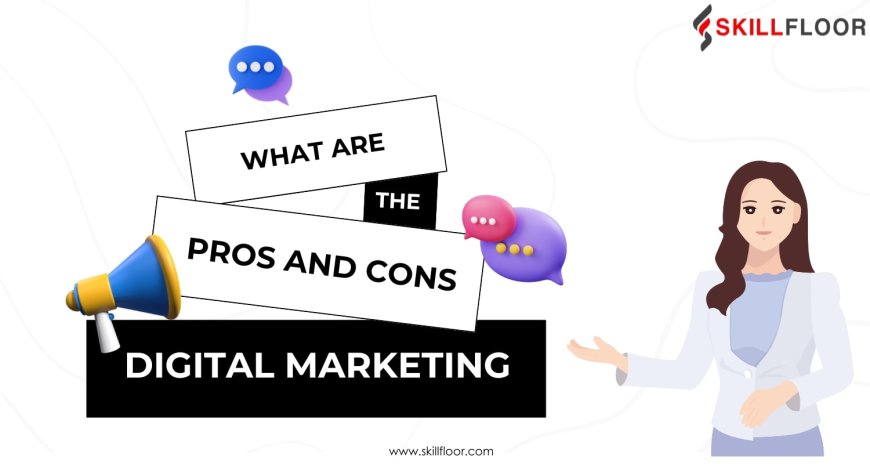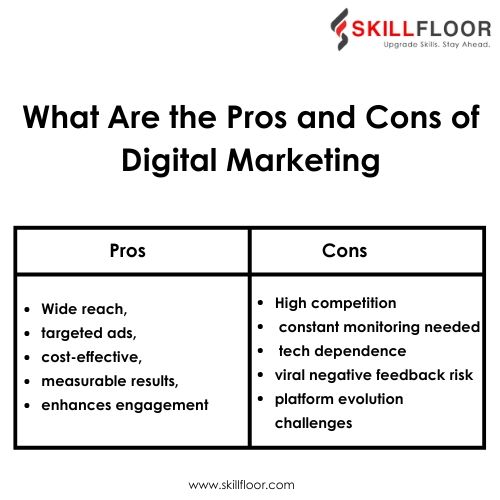What Are the Pros and Cons of Digital Marketing
Explore the pros and cons of digital marketing to understand its impact on business growth. Learn key insights on digital marketing strategies and effectiveness.

Knowing the upsides and downsides of digital marketing is crucial for businesses aiming to succeed online. Digital marketing is essential for modern business strategies, covering everything from social media campaigns to SEO practices. However, like any powerful tool, it has its advantages and challenges. digital marketing uses online platforms to reach a wide audience quickly and effectively. It allows businesses to target specific groups accurately, tailoring messages that resonate with potential customers. This targeted approach not only boosts brand visibility but also increases engagement, leading to meaningful interactions that can result in sales. One major advantage of digital marketing is its ability to measure impact. Unlike traditional marketing, digital campaigns can be closely tracked and analyzed. Metrics like website traffic, conversion rates, and engagement provide valuable insights into how well campaigns are performing, enabling marketers to adjust strategies in real time.
On the downside, digital marketing can lead to information overload. With so many messages bombarding consumers daily, it's hard to stand out online. Also, digital platforms change rapidly, requiring businesses to keep up with new trends and algorithms. Effective SEO is crucial for digital marketing success, ensuring businesses rank high in search results. An expert in SEO knows how to optimize content to attract organic traffic and improve visibility, which is vital for successful digital marketing strategies. While digital marketing offers great opportunities for growth and engagement, understanding its pros and cons is key. By leveraging its strengths and addressing its challenges, businesses can fully use digital platforms to succeed in today's competitive market.
Understanding the Pros and Cons of Digital Marketing
Knowing the advantages and disadvantages of digital marketing is crucial for businesses looking to succeed online. Digital marketing offers great opportunities for businesses to reach and connect with global audiences instantly. It allows businesses to target specific groups of people more effectively and run advertising campaigns that are budget-friendly. Plus, they can track how well their campaigns are doing in real time, so they can make adjustments as needed to get better results. But digital marketing also has its challenges. The online world changes fast, so businesses have to keep learning and changing their strategies. This takes a lot of time and money. There are also worries about people's privacy and keeping their information safe. Businesses need to have strong plans in place to protect people's information and keep their trust. And, to do all of this well, businesses need experts in areas like Social Media Marketing, SEO, and managing a company's reputation.
Businesses need to understand all of these things so they can make the most of digital marketing's good parts while working around its challenges. By using experts who have the right training and planning their strategies well, businesses can do better in the online world, grow more, and keep their customers happy.
The Benefits and Challenges of Digital Marketing
Digital marketing has both advantages and challenges that businesses need to consider carefully in today's market. It offers great opportunities but also comes with some difficulties that can affect how successful your campaign is. One big advantage of digital marketing is its ability to reach a large audience very precisely. Businesses can target exactly who they want to reach through social media, search engines like Google, and email. This helps make marketing campaigns more effective. Additionally, digital platforms give you data right away so you can see how well your strategies are working and make changes as needed.
But there are challenges too. One of the main problems is that digital platforms and technology are always changing. This means businesses have to keep learning and adapting to stay successful. Also, navigating the digital world requires knowledge in many areas such as SEO (making your website easy to find on Google), content marketing (creating useful information for your customers), and paid advertising (paying to show your ads to people).

What are the advantages and disadvantages of digital marketing?
Advantages (Pros):
1. Global Reach: Digital marketing helps businesses connect with people worldwide using platforms like social media and search engines.
2. Targeted Advertising: It allows businesses to focus their marketing efforts on specific groups based on demographics, interests, and behaviors, making campaigns more effective.
3. Cost-Effectiveness: Compared to traditional marketing, digital marketing often gives better returns on investment and lower costs per customer acquired.
4. Measurable Results: Marketers can track how well their campaigns are doing in real time, making it easier to make changes that improve results.
5. Engagement: Interactive content lets businesses interact directly with customers, which can build loyalty and satisfaction with the brand.
Disadvantages (Cons):
1. Digital Noise: With so much content online, it's hard for businesses to get noticed by their target audience.
2. Technical Skills Required: Successful digital marketing needs knowledge of tools, analytics, and platforms.
3. Dependency on Technology: Problems like changes to algorithms, platform rules, or technical issues can affect how well campaigns work.
4. Data Privacy Concerns: Laws and people's concerns about privacy make it harder to use targeted ads.
5. Constant Changes: Digital marketing changes fast, so businesses have to keep learning and changing to stay ahead.
Digital marketing brings chances for businesses to grow and connect with customers well. But it also brings challenges that need careful planning and changes. Knowing the good and bad sides of digital marketing can help businesses use their strengths while dealing with any problems. For more tips on making digital marketing work for you, visit Skillfloor.
Digital marketing has both advantages and challenges. It's cost-effective, allows for measurable results, and reaches a wide audience. But there are downsides too, like digital clutter, privacy worries, and relying too much on technology. Businesses need to find a balance: using creative strategies and respectful engagement to tackle these challenges and make the most of digital marketing opportunities.




























































